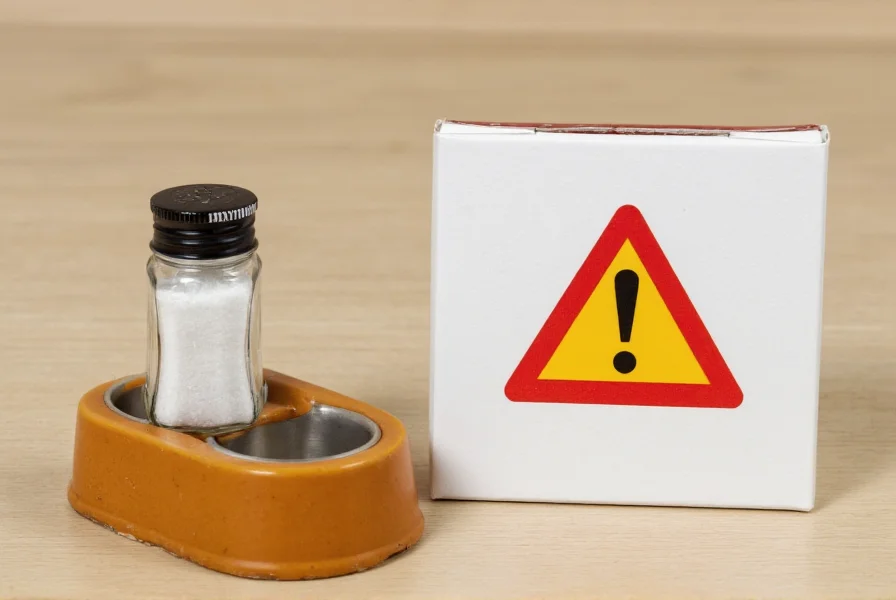No, dogs should not have salt and pepper. While tiny accidental amounts might not cause immediate harm, these common seasonings offer no nutritional benefits for dogs and can lead to serious health issues when consumed regularly or in larger quantities. Excessive salt intake can cause sodium ion poisoning, while pepper can irritate a dog's digestive system and respiratory tract.
As a dog owner, you want to provide the best care for your furry companion, including understanding what human foods and seasonings are safe. When it comes to common kitchen staples like salt and pepper, the answer is clear: these seasonings should be avoided in your dog's diet. Let's explore why these seemingly harmless seasonings pose risks to canine health and what safer alternatives exist.
The Dangers of Salt for Dogs
Salt, or sodium chloride, is an essential mineral that dogs need in small amounts for proper bodily functions. However, the amount required is significantly less than what humans consume. Commercial dog foods already contain appropriate levels of sodium for canine health.

Why too much salt is dangerous:
- Sodium ion poisoning: Consuming excessive salt can lead to hypernatremia, causing symptoms like vomiting, diarrhea, tremors, and in severe cases, seizures or death
- Dehydration: Salt draws water from body tissues, leading to increased thirst and urination
- Kidney strain: The kidneys must work harder to process excess sodium
- Long-term issues: Chronic high salt intake can contribute to hypertension and kidney disease
The Association of American Feed Control Officials (AAFCO) recommends that adult dog food contain a minimum of 0.3% and maximum of 1.5% sodium on a dry matter basis. Most commercial dog foods fall within this safe range, making additional salt unnecessary and potentially harmful.
Understanding Pepper's Effects on Dogs
Unlike salt, pepper isn't nutritionally essential for dogs at all. Black pepper contains piperine, which gives it its distinctive flavor but can cause several issues for dogs:
- Digestive irritation: Can cause stomach upset, vomiting, and diarrhea
- Respiratory issues: The fine particles can irritate nasal passages and lungs when sniffed
- Mouth discomfort: Burning sensation in the mouth and throat
- No nutritional value: Provides zero health benefits for dogs
While a small amount of pepper accidentally consumed likely won't cause serious harm, it's not something you should intentionally give to your dog. Some dogs may be more sensitive than others, with smaller breeds particularly vulnerable to even small amounts.
How Much Is Too Much?
Understanding dangerous quantities helps dog owners assess risk:
| Seasoning | Safe Amount | Dangerous Amount | Severe Risk Level |
|---|---|---|---|
| Salt | Less than 0.5g per pound of body weight daily | 1-2g per pound of body weight | Over 4g per pound of body weight |
| Pepper | Minimal accidental exposure | 1/4 teaspoon or more | 1/2 teaspoon or more |
For example, a 20-pound dog could experience salt toxicity from as little as 10-20 grams of salt (about 2-4 teaspoons). Many processed human foods contain much higher salt levels than what's safe for dogs.
Recognizing Seasoning Ingestion Symptoms
If your dog accidentally consumes salt or pepper, watch for these symptoms:
| Symptom Type | Salt Overconsumption | Pepper Ingestion |
|---|---|---|
| Immediate (1-6 hours) | Excessive thirst, vomiting, diarrhea, lethargy | Sneezing, pawing at mouth, drooling, coughing |
| Moderate (6-12 hours) | Loss of appetite, tremors, weakness | Continued vomiting, diarrhea, abdominal pain |
| Severe (12+ hours) | Seizures, high fever, coma | Difficulty breathing, bloody vomit |
If your dog shows severe symptoms after consuming salt or pepper, contact your veterinarian or an emergency animal hospital immediately. For salt toxicity, early intervention is critical to prevent permanent damage.
Why Dogs Process Seasonings Differently Than Humans
Dogs have different digestive systems and nutritional needs than humans. Their taste receptors aren't designed to handle the same flavor profiles we enjoy. What tastes mildly seasoned to us can be overwhelming or irritating to dogs.
Unlike humans, dogs don't benefit from the flavor enhancement that seasonings provide. In fact, consistently feeding seasoned foods can lead to picky eating behaviors and make dogs refuse their regular, nutritionally balanced dog food.
Safer Alternatives for Flavoring Dog Food
If you're looking to enhance your dog's food for picky eaters or special dietary needs, consider these veterinarian-approved alternatives:
- Low-sodium broth: Homemade bone broth with minimal salt
- Plain cooked meats: Shredded chicken or beef without seasoning
- Pumpkin puree: Plain canned pumpkin (not pie filling)
- Herbs: Small amounts of dog-safe herbs like parsley or basil
- Yogurt: Plain, unsweetened yogurt for digestive health

Always introduce new foods gradually and in small quantities to monitor for any adverse reactions. Consult your veterinarian before making significant changes to your dog's diet, especially if they have existing health conditions.
Preventing Accidental Seasoning Ingestion
Many seasoning-related issues occur accidentally. Protect your dog by:
- Keeping the dining table clear when dogs are present
- Properly disposing of food scraps that contain seasonings
- Using dog-proof trash cans
- Training your dog the "leave it" command
- Being cautious when cooking near your dog
- Reading labels on human foods before sharing any with your dog
Remember that many human foods contain hidden salt and seasonings. Processed foods, restaurant meals, and even some "healthy" snacks often contain much higher sodium levels than what's safe for dogs.
When to Consult Your Veterinarian
If your dog regularly refuses their food, consult your veterinarian before attempting to season it. What appears to be pickiness might indicate an underlying health issue. Your vet can help determine if dietary changes are appropriate and recommend safe options.
For dogs with specific health conditions like kidney disease, heart problems, or hypertension, even small amounts of additional salt can be dangerous. Always follow your veterinarian's dietary recommendations for dogs with medical conditions.










 浙公网安备
33010002000092号
浙公网安备
33010002000092号 浙B2-20120091-4
浙B2-20120091-4